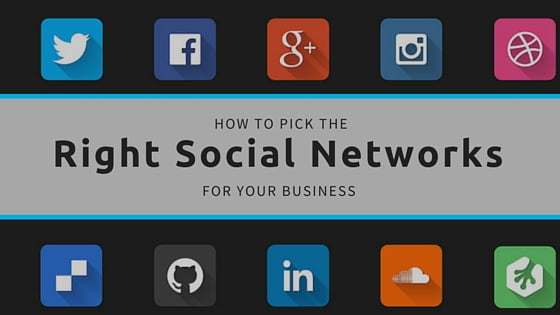
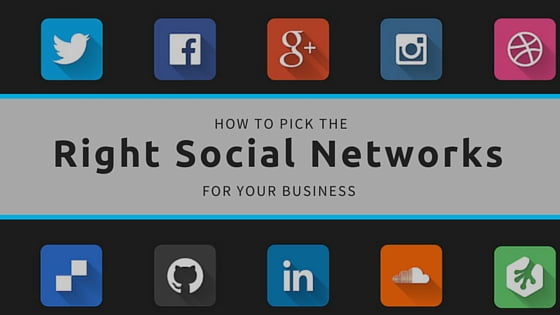
Pick and choose your social networks.
In fact, often times it may be best not to be on certain social networks, perhaps because of the time it takes to do social right or because your customer personas don’t fit with a particular network. When you’re choosing which social networks to be involved with, it’s okay to be picky.
The next step is making an educated decision on which social networks to choose. There are a big number of factors that could weigh a decision for you, and I’ve done my best to collect them here in this post. From demographics to research and a whole lot else in between, here is what I’ve found to help you choose your social networks.
Choosing the right social network for your business may not be as easy as one may initially think. Sure, you can start by creating accounts for your company on all the top social networks out there, but who will manage them?
Being present on all the leading social media platforms is not a bad thing if you’re sure that you have a social media manager to take charge and to handle your brand’s online presence. However, if you’re just starting off, you should limit yourself to the key social networks relevant to your business.
Even if you’re a big company, you will always have a stronger focus on some platforms as opposed to others, depending on where your clients and potential clients can be found.

How do I start finding the right social network?
Everything begins with research. Try to see the metrics for each social network. What do their demographics look like? Who are the people present on their platform? What do they like to do? Where do they live? How much time do they spend online?
All these questions will offer you the much-needed answers in developing your social media strategy. Not only that, but they will point to a clear direction on what social network hosts your key audience.
What are the top social networks to take into consideration?
At first, you will need to start with the top 4 titans of social media: Facebook, Twitter, Instagram and LinkedIn. Sure, YouTube is right up there with these four, but it’s focused strictly on video content, making the platform usable for niche categories of business, mostly in the creative fields.
Facebook is all focused on building long-term relationships with your audience and requires a lot of time put into digital communication efforts. Be sure to constantly engage with your audience, because the social network’s algorithms will easily mark you as less relevant if your fans and followers don’t interact with your updates.
Twitter is very important if you want to communicate short, straight to the point updates, likes breaking news, or if you want to live stream events (this is where Youtube is also highly recommended!). Twitter allows you to post fast updates before offering more generous content on your blog and other social networks. It’s a good place to keep your audience informed in real-time, before you start giving them more details.
LinkedIn is the way to go, especially if you’re thinking of having a more B@B (business 2 business) approach for your company. It’s the easiest place to target people based on their profession and their industry. It’s easy to stay connected with top players in your field, and also a good place to keep an eye on your competition. Don’t count this social network out.
Instagram & YouTube are niche platforms focused on visual content. This can really bring a lot of attention to your brand, because they’re the fastest-growing social networks online. If you’re planning on choosing to work with visuals, which is highly recommended, be sure to choose high-quality images and videos. This will make your company stand out from the crowd. Try to avoid generic stock photos and videos, because most users can spot them a mile away.

What to do after you have chosen the most suitable social network?
No matter the social network you decided to choose for your company, one thing’s certain – Be consistent, be constant! It’s always recommended to constantly update your social networks, because otherwise, you’ll give the impression that your brand is fading away.
Keep things interesting with fresh content whenever you post and don’t forget to engage with your audience.
Questions and Answers about how to choose the right social network for your business.
What are the top social networks to take into consideration?
At first, you will need to start with the top 4 titans of social media: Facebook, Twitter, Instagram and LinkedIn. Sure, YouTube is right up there with these four, but it’s focused strictly on video content, making the platform usable for niche categories of business, mostly in the creative fields.
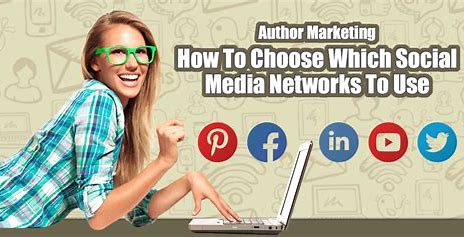
How to grow my network on Social Media?
The best way to grow your network on social media is to post frequently, with high quality content for your followers and for people that will find your content online. By using correct hashtags will spread your content further, and by responding to comments on your posts is another great way to gain more followers. If people see that you are active and knowledgeable in your industry they will naturally follow you and your network will grow.
Social networks, ranked by monthly active users:
- Facebook: 2,44 Billion
- Google+: 3,8 Billion
- Twitter: 68 million
- Instagram: 200 million
- LinkedIn: 630 million
- Pinterest: 300 million
How many people use Twitter?
In the first quarter of 2019, the number of monthly active U.S. Twitter users amounted to 68 million, an increase from 66 million in the previous period. In recent times, Twitter's user growth has been not endeared the company to its investors — the growth compared to the previous quarter only amounted to three percent and has hovered in the low single digits since 2017 as the company continues to struggle to attract and retain users.
16 LinkedIn Statistics That Matter to Marketers in 2019
What is LinkedIn worth to your business, and what are the LinkedIn statistics that will help you perfect your marketing strategy on the platform? ?
LinkedIn is unique among the major social media players because it has a very specific user base. That is, educated and affluent people who are already in a professional headspace and actively looking for solutions.
If your brand is yearning for a calm, focused alternative to the oversaturation and vitriol of 2019’s social media landscape, then LinkedIn gets even more attractive.
Hootsuite CEO Ryan Holmes singled out the platform’s continued rise as one of his top trends for 2019.
LinkedIn user statistics
1. Two professionals join LinkedIn every second
Even before 2016, LinkedIn’s growth was reliable:
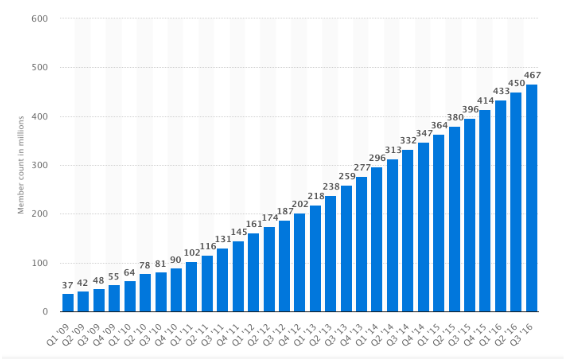
2.2. 155 million Americans workers have Linkedin profiles.illion American workers have LinkedIn profiles
America has the highest number of LinkedIn users.
The remaining 70 percent of users live in 200 other countries and territories around the world. And users can engage the platform in 24 different languages.
3. 50% of Americans with a collage degree us Linkedin
4. 45% of Linkedin users are in upper management.
LinkedIn usage statistics.
5. 57% of Linkedin use is on mobile.
6. 3.5 million Americans jobs are posted on Linkedin every Month.
Linkedin Demographics
- More than 70% of Linkedin users are from Outside the US.
- 90 million LinkedIn users are senior level influencers and 63 million are in decision-making positions.
- 40 million students and recent college graduates on LinkedIn.
- There are 57% of male users and 43% female users on Linkedin.
- After US, India, Brazil, Great Britain and Canada have the highest number of Linkedin users.
- 25% of Millenials (18-24 years old) use Linkedin.
- There are 87 million Millennials on LinkedIn with 11 million in decision-making positions.
- 28% of All Internet male users use Linkedin, whereas 27% of All Internet Female users use Linkedin.
- 49% of Linkedin users earn more than $75,000 in a year.
- 51% of US College Graduates use LinkedIn.
- 190 million workers in the US have Linkedin profiles.
- 11% of adults aged 18+ can be reached with adverts on Linkedin.
Linkedin Content Marketing
- LinkedIn is the #1 channel B2B marketers use to distribute content at 94%.
- Of 500 million users, just 3 million users share content weekly.
- LinkedIn makes up more than 50% of all social traffic to B2B websites & blogs.
- 91% of marketing executives list LinkedIn as the top place to find quality content.
- 92% of B2B marketers include LinkedIn in their digital marketing mix.
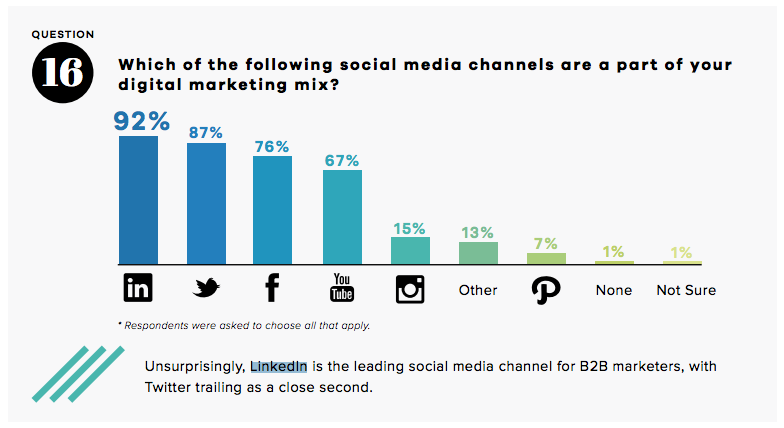
Twitter statistics.
Twitter is still an important social platform for advertisers and immediate customer service. So you should still keep a close eye on the essential social media statistics specific to this platform.
- 88% of social advertisers use it. This makes it even more popular than Instagram.
- The platform earned a total of $665 million in revenue during the first quarter of 2018–a 21% increase year over year.
- $575 million of this total revenue came from ads. That’s another 21% increase.
- Videos accounted for more than half of this ad revenue.
- Between May and June of 2018, Twitter suspended more than 70 million fake and suspicious profiles. This may have caused a drop in the total count of users, but also served as a move to increase the authenticity of the content on the platform and build user trust.
- There are currently 326 million monthly active users on the platform.
- Twitter users send out 500 million tweets per day.
Instagram statistics
Instagram has been experiencing a rapid and steady growth in the number of monthly active users. The platform has also undergone plenty of changes in terms of features and interface. One of the most significant changes was the introduction of IGTV, which enables users to share long-form video content with their followers.
Marketers need to be prepared with updated social media stats specific to Instagram if they want to stay ahead of the curve in 2019. Here are some stats to know for the platform:
- The number of monthly active Instagram users has grown to 1 billion according to the latest social media statistics.
- Instagram continues to attract a younger audience with 72% of teens saying that they use the platform. This is an impressive increase from 2015 when 52% of teens said that they used the platform.
- Since 2016, there’s also been a 7% increase in the number of US adults who use the platform with 35% of them currently using it.
- Even in terms of engagement, Instagram is ahead of Facebook with a median engagement rate of 1.60% per post for brands.
- But among marketers, Instagram still takes second place to Facebook with 83% of them using the platform.
- In spite of this, the ad spending on Instagram is 23% higher than on Facebook according to an internal analysis by Merkle.
- The platform is getting tons of activity with users uploading more than 100 million photos and videos on a daily basis.
- 2 billion Likes occur on the platform every day.
- Wednesday is the best day to post on Instagram for brands across all verticals.
- Instagram Profiles saw a follower growth rate of 17-33% during 2018.
- Videos get 21.2% more interactions compared to images and 18.6% more interactions compared to carousels.
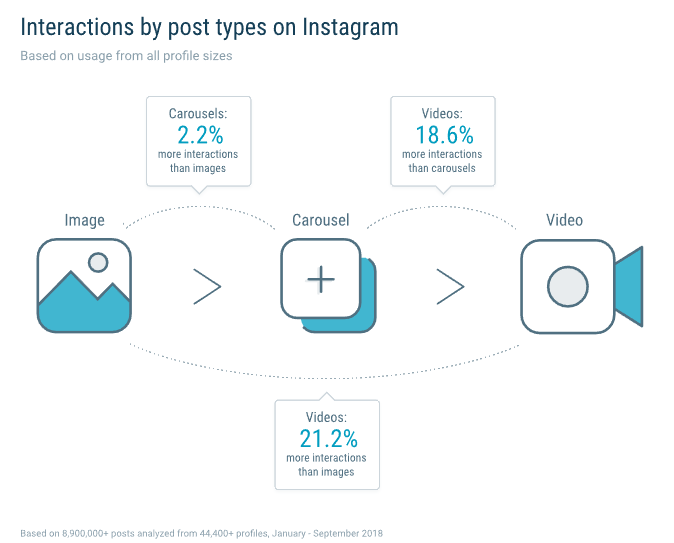
Social media advertising statistics
With changes in social media algorithms, it has become a lot more challenging for brands to earn organic engagement. Now paid social media advertising has become a necessity for brands that want visibility and results. Check out these social media statistics for your social media advertising efforts in 2019:
- Social networks are the biggest source of inspiration for consumer purchases with 37% of consumers finding purchase inspiration through the channel.
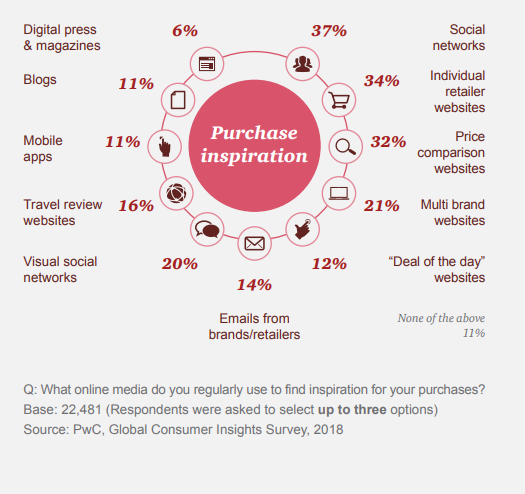
- Social media advertising spend in the US is expected to reach $18.4 billion in 2019.
- Emarketer estimated that the ad spending on social video in the US increased by 38.1% during 2018, reaching $7.85 billion.
- Facebook controlled 84.9% of this social video ad growth.
- Social media is the most relevant advertising channel for 50% of Gen Z and 42% of millennials.
- 57% of millennials feel that ads are becoming more relevant.
- 45% of Gen Z and 41% of Gen X-ers feel the same, while only 27% of Baby Boomers feel this way.
- Non-customers are three times more likely than customers to visit retailers from social media ads.
- 50% of consumers said that seeing user-generated content would increase their chances of buying products through a brand’s social media.
- 49% said that easy payment systems (like Amazon Pay) would increase their chances of buying through social media.

Social media engagement statistics
Social media bridges the gap between consumers and brands by providing them with a platform to engage with each other. Brands need to make the most of this and create opportunities for interaction and connection. Otherwise, they could end up losing potential customers.
High social media engagement rates will also improve other aspects of a brand’s performance. Keeping an eye on social media statistics regarding consumer preferences and engagement trends is a great way for brands to refine their engagement efforts. The Sprout Index cited earlier highlighted some important stats on social media engagement. Let’s take a look:
- 80% of social marketers said that their key strategy is to increase engagement across social channels.
- Posts with links to more information are the most preferred type of content on social media. 30% of consumers said that it’s the content they like to see most from brands on social. 18% preferred graphics and images, while 17% would like to see produced video.
- 61% of social marketers prioritize social media posts that teach. 58% focus on telling a story and 53% focus on posts that inspire.
- This shows that there’s a huge misalignment with what consumers actually prefer. 73% of consumers want to see posts about discounts and sales. 60% want to see posts that showcase new products and services. 59% want to see posts that teach something.
- 58% of consumers prefer visual-first content, with their main preferences being graphics and images and produced video.
- 74% of consumers share video content from brands on social media.
- Consumers are equally likely to share and engage with inspirational posts from brands.
- For 45% of consumers, social media is one of the first channels they go to in case they have any questions or issues.
- In fact, 21% of consumers would rather message a brand on social media instead of calling up customer service.
- 88% of social marketers said that it’s important for their brands to provide customer service through social media.
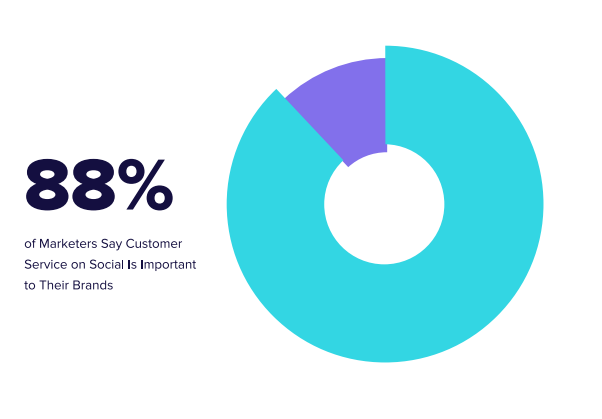
62. The most common reason why consumers reach out to brands on social media is because they have a question. 57% of consumers reported doing this.
63. The second most common reason is to have an issue with a product or service resolved. 45% of consumers have done this.
64. A fair amount of people (34%) also reach out to brands on social media so they can commend them on their products or services. Brands should use all of these instances as an opportunity to build relationships.
65. 21% of consumers are more likely to buy from brands that they can reach on social media.
Best New Market Network for the Future.
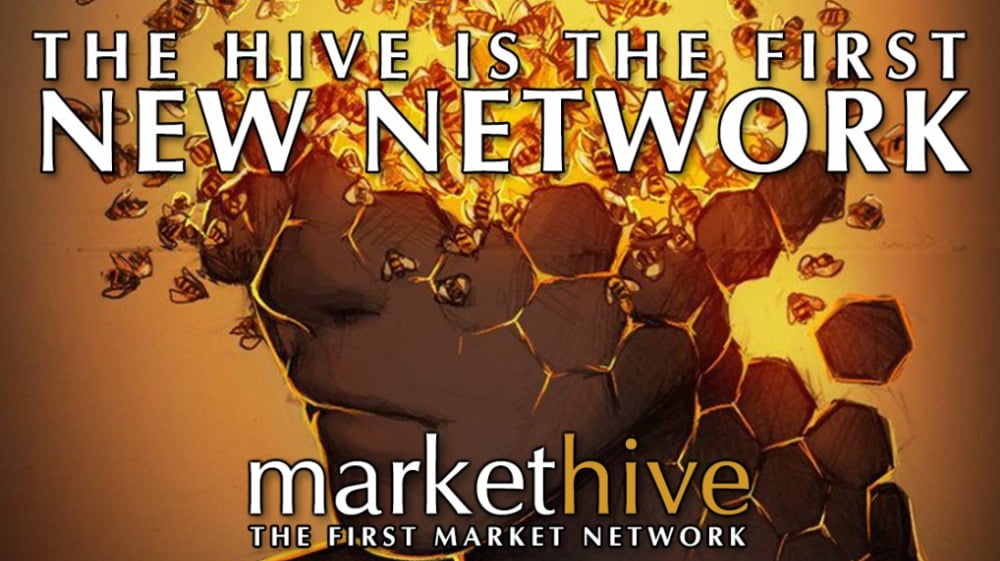
Own A Piece Of Markethive — Lifetime Income Opportunity
Markethive, the first Social/Market Network built on the Blockchain, introduces The Entrepreneur Program
Click here, Markethive is Completely Free To Join
The Entrepreneur program is designed to leverage your system. Your free Markethive system is a market network, like a social network, but with powerful inbound marketing tools integrated into the system. This premier hybrid social network includes news feeds, blogging platforms, video channels, chat channels, groups, image sharing, link hubs, resume, profile page and peer to peer commerce. But more than a social network, we have also delivered to you “Inbound Marketing tools” like broadcasting, capture pages, lead funnels, autoresponders, self-replicating group tools, traffic analytics, and more. Plus, we are built on the Blockchain which allows Airdrops of 500 Markethive Coin (MHV) upon joining and micropayments for using the tools mentioned above. This is all free to you.
The Entrepreneur program is designed to add gold plating to an already stellar and unbelievably valuable system you receive for free.
The Markethive Coin — MHV Consumer Coin
Notably, MHV was listed on the first of many exchanges, including its own exchange [in development] in March in 2019 and is currently valued at $0.18. The Markethive coin will not be dependent upon speculative value as is the case with other cryptocurrencies and platforms, thereby creating eternal economic velocity in the entrepreneur ecosystem within Markethive.
Click here, Markethive is Completely Free To Join

Click here, Markethive is Completely Free To Join
